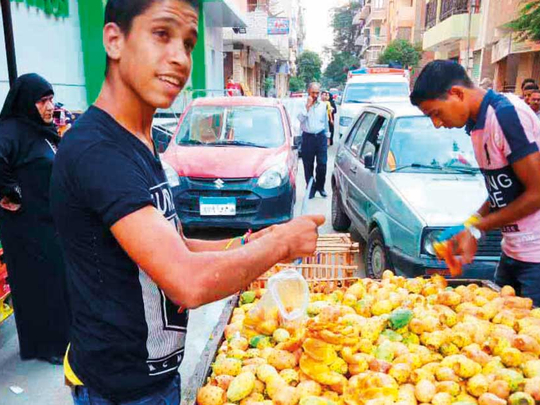
Cairo: “How sweet, you are the prickly pears!” Khaled Sobhy shouts tunefully as he touts his spiny fruit. “You are sweeter than the grapes and pears, but cheaper in price,” the young street vendor sings out as he peels off the skin of a prickly pear for a customer.
Stationing with his pushcart in a street in the working-class district of Al Mataria in northern Cairo, Sobhy sprinkles water over his goods in order to tame their hairlike thorns.
“This vocation is one of the most painful because prickly pears are known for their thorny skins that easily stick to the hands,” the 20-year-old peddler told Gulf News.
“However, the profits I make from selling the pears during summer reward me for the thorns that nestle in my hands as a result of removing their skins to offer the sweet fruit to the client.”
Prickly pears are oval fruits that have a variety of colours ranging from yellow and pink to red, depending on their ripeness. The fruit is widely popular across Egypt in the summer due to their cheap prices compared to other types of fruits.
“The season of prickly pears runs from mid-June to late August,” says Sobhy, who sells spicy boiled chickpeas, a popular hot drink, in the winter for a living.
“I start my day selling prickly pears only in the afternoon when people usually leave their houses as the summer temperatures ease. Customers like the red fruit because of its sweet taste.”
Sobhy, originally a native of the Upper Egyptian province of Minya, says he buys his goods from prickly pear farms in the area of Al Khanka in Qliubia north of Cairo. The fruit also grows in large quantities in the Sinai desert, the New Valley in western Egypt and the Suez Canal city of Ismailia.
“One box of prickly pears costs me about 70 [Egyptian] pounds (Dh14.8) and I sells it for 100 pounds. I can sell two to three boxes a day. The demand is especially high in the evening in crowded areas.”
Like most of his colleagues, Soby takes his merchandise to working-class districts in the Egyptian capital where prickly pears are widely popular.
“Amid the soaring prices of everything in the country, the price of prickly pears is still affordable to the poor. Therefore, they call it [the prickly pears] the fruit of the poor.”
Egyptians have been hit by a spate of price hikes since last November when the country floated the local pound and cut state subsidy on fuel as part of harsh economic reforms.
“We are poor and feel the suffering of the poor, who are struggling in order to survive. We help them by selling them a beneficial fruit for a cheap price,” he says.
Sobhy retails the red type of prickly pears for LE1.5 per piece, while one yellow fruit sells for LE1.
“Spraying water over prickly pears makes it perishable. Therefore, it is necessary to sell the pears, which have become wet, within a short while or they would rot. Sometimes, I have to lower the price and sell one piece for 75 piastres (less than one pound] lest the pears perish. I often do this before midnight as I prepare to return home.”
Prickly pears have a wealth of nutrients, according to nutritionists. The fruit is rich in vitamins and minerals that enhances the immune system, improves the digestive system and helps lower the cholesterol levels.
“So, prickly pears are like a pharmacy that contains a lot of healing medicines,” says Mohammad Al Sohagy, another street seller.
“Prickly pears are popular with different classes, including the wealthy who can buy the most expensive types of fruits,” adds Al Sohagy, who hails from the Upper Egyptian province of Sohag.
“But fruit stores never sell prickly pears. You only find them with street vendors. Therefore, I often push my cart and stop it at a street corner in high-class areas such as Heliopolis and Roxy [in eastern Cairo] where I make handsome profits by the end of the day,” he says in a satisfying smile.
Al Sohagy adds that owners of classy cars and young couples usually gather around his cart topped with ripe prickly pears and make orders for buying the fruit.
“Trouble only comes when municipality police show up and order me to leave the area, or they would confiscate my goods. I then have to head for another area where there are no police.”












